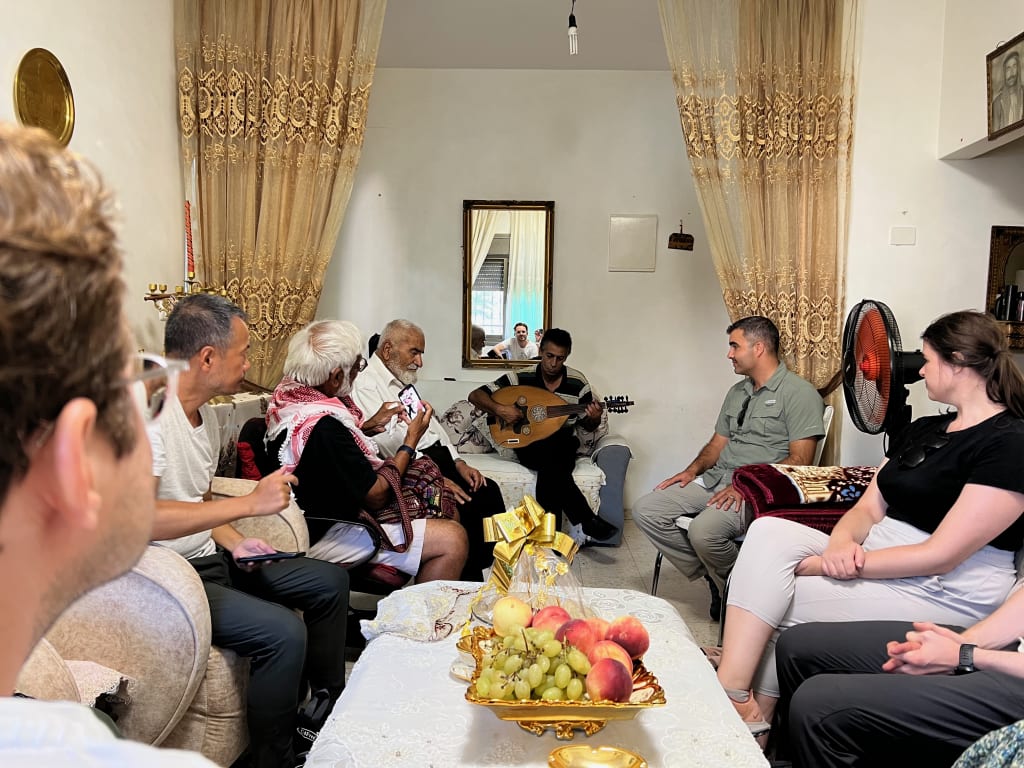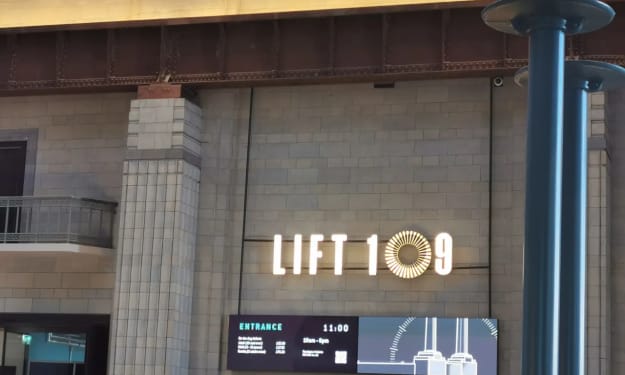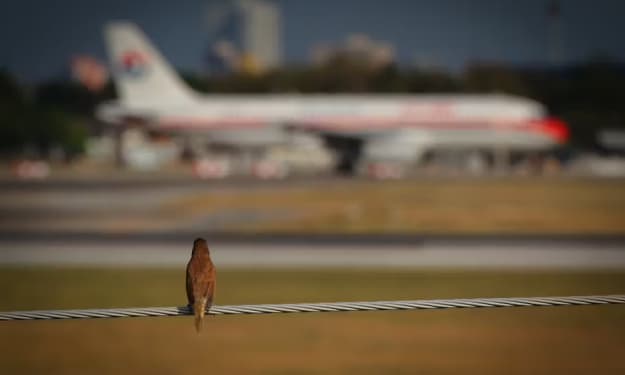The Unseen Bonds Between Us
An Oud to Peace

"Asef ya habibi, bit'arif wayn fanduq al-National fi al-Quds?", they asked.
“You’re looking for the National Hotel Jerusalem?” I replied, feeling a smug surprise that was becoming familiar. “Sorry, I’m not from around here.”
After the two men thanked me profusely (or hurled homophobic epithets? I couldn’t tell the difference), I broke my facade and turned to Jack: “What were the odds of people asking me for directions in Hebrew and Arabic on the same day?! Both teams are claiming me now. That’s it, I’m home!” My grin was wide with silly joy.
Every day of my life seemed to have led up to this trip. Growing up in the Caribbean with a European passport, a “sensitive” boy encircled by a lapping sea of machismo, the son of a White man gone too soon and a Black woman who had bigger fish to fry, raised doggedly Catholic but forever daydreaming about those distant Crypto-Jewish ancestors whose name I kept alive - I’d long come to understand myself as a minority of one. In this new place, the age-old stones everywhere had recognised me. Sometimes, a sunny voice would call me into a shop with an affectionate “Habiiibi” - clearly a sign that we'd know each other from before. Other times, I’d walk through a school of shtreimel hats swimming around the souk. Judging by the unphased looks cast my way from under the brims, they knew me well enough not to scurry away - something that never would have happened in Paris. At long last, I belonged somewhere.
A weak half-smile struggled to form on Jack's stoic face. His posture, typically upright and rigid, now slumped under the pressure of his imposter syndrome. While I was consumed with the thrill of turning 40 in this most special land, he felt more suffocated with each passing day. It began with the immigration officers who greeted my joyful shaloms with equal cheer but then took him away for further questioning — his discomfort was so evident that they found it suspicious.
While I’d grown up fantasising about Jewish identity as a secret superpower, the rare minority identity I could begin to claim with pride, Jack was raised by two bona fide Jews who had bonded over their discomfort around Jewish cliques. His only dips into the culture extended to family funerals and a special relationship with pickles. He was sent to Christian schools and taught that “Jack” was the only J-word he was to share publicly, preferably in a posh southern English accent. The paranoid glances he darted at the Western Wall screamed, “This place is dangerous”. The short and elusive “London” he replied to locals enquiring about his background suggested, “Don’t judge me for what’s going on here. That has nothing to do with me!” Despite never leaving each other's side, we were in very different places.
“We should join the rest of the group now. It’s time”.
I'd known him long enough to understand what he meant by that – this was no game. We were going to be the tourists we had agreed to be, complete with a sense of ignorant neutrality as our free pass in this landmine of a country.
We strolled back to East Jerusalem, passing by the chaotic swarm of black garbs in Mea She’arim. He tried his best to avoid the curious eyes of the Yeshiva students surrounding us while I attempted to ignore the sweet smell of sufganiyot wafting from local bakeries. We continued past Shmu’el ha-Navi St, Sderot Hayim Barlev and crossed into “Palestine” again after Nablus Rd. After a few days of exploring independently, we were about to start our tour with Jamal and meet our fellow travellers. Everything felt monumental and sacred. Ever since our "once upon a time" had started some 17 years ago, we regularly discussed how we both identified as “Jew-ish”, although that held different meanings for each of us. Visiting this country together had always been an idea, but our reservations towards the Israeli government had repeatedly held us back. With the prime minister we never liked finally ousted, and my upcoming 40th birthday calling for a memorable celebration, our stars had finally aligned with the Star of David!
Jamal came from a long line of Jerusamelites. A graduate of Middle Eastern history and an experienced community organiser in his hometown, he was just who I needed to learn from. Over the next few days, he would shepherd us through the Old City and countless places of worship. We'd share meals with a Rabbi in West Jerusalem and a Palestinian family in Bethlehem. We’d fight back tears in Yad Vashem, play “boys to buoys” in the Dead Sea, and assist NGOs in bringing water to Palestinian farmers. We'd also explore the lush landscapes of the North and take a road trip along the coast to reach the belly-dancing South Beach they call “Tel Aviv”.
One night, the heaviness grew overwhelming. We had spent the day under the scorching sun of Masada, and the weight of exhaustion was almost too much to bear. Although we were about to sleep in a barn, it hardly felt like a cosy Christmas setting. Just as we were settling in for the night, we received news of the Queen's passing through a brief moment of mobile service. Jack needed some time alone and went for a walk. I didn't offer to join him, too tired from the day and unable to relate to his feelings about the royal demise. To this day, I still regret it. The next thing I knew, he returned with blood covering the left side of his face. He had been walking around the village when Arabic voices confronted him. His gut told him it was antisemitic abuse; the menacing thuds of the shoes chasing him confirmed it; the stone that struck his temple solidified his belief that this trip was a mistake. His unspoken resentment only fueled my silent guilt. Neither of us got much sleep that night.
Two nights later came the moment I had been eagerly anticipating. As our group attempted to decipher the graffiti on the separation wall in Bethlehem, I could feel the energy shifting. Some fellow travellers had even started wearing Keffiyeh scarves, while others took vocal offence. At that point in the trip, we knew too much about the place and one another to be neutral anymore; the air was hot, but not as much as our tempers.
We finally arrived at the Al-Qudsi family's apartment. The living room, where they entertained their guests, took up about half the total space. While the other rooms were simple and bare, this one was adorned with lavish golden curtains, fruit bowls, ashtrays, and candelabras. Mohammed, the patriarch, greeted us individually and, with Jamal translating, regaled us with anecdotes spanning nine decades. He answered every question about being a schoolboy in Mandatory Palestine, moving away from his destroyed village during the Naqbah, and reciting the poetry he learned from his uncle, who had since fled to Lebanon with his nine girls. Soon after our host started telling us about Shadi, the son he'd lost to the Second Intifada, his breathing grew less regular. He stood motionless for endless minutes, looking into the void, probably fighting back tears and trying to put his masculinity where he thought it belonged – above the vulnerability and despair.
+ His son-in-law Yusuf took over the storytelling and let his oud speak for the family for the next hour. As I sat there watching and taking a photo from my angle, I noticed Jack's right ear next to me, and his face reflected in the mirror behind Yusuf. Through the music, I could sense the Al-Qudsis' emotions, representing those of so many others in this area, transcending language barriers, words even, and entering Jack’s mind through an ear respectfully perked up. The mirror was at the opposite end of the room, but I could still see his features soften. His high cheekbones, inherited from his mother, lifted slightly, gradually sketching an unreserved smile on his face. His rigid stance disappeared as he relaxed into an open and flexible posture to absorb the melisma of emotions we all felt relieved to share.
That night, and every night we recalled that scene at the Al-Qudsi's, words became unnecessary. Some appeared to have outlived their usefulness, clinging onto outdated divisions. After we’d witnessed such different people communing to the sound of the oud, a key was left inside us - a reminder that no one could feel chosen by the music at the expense of another; neither could they lay an exclusive claim to the melody, nor cut across it with separation walls. As the oud's harmony taught us, the same applies to our world.
About the Creator
Manu Wachter
Peel years of corporate DEI experience. Roast the skinned identities in a tray. Scatter slices of humour and insert cloves of poetry into the juicier cuts. Serve smothered in French Caribbean gravy. Enjoy!
Enjoyed the story? Support the Creator.
Subscribe for free to receive all their stories in your feed. You could also pledge your support or give them a one-off tip, letting them know you appreciate their work.






Comments
There are no comments for this story
Be the first to respond and start the conversation.